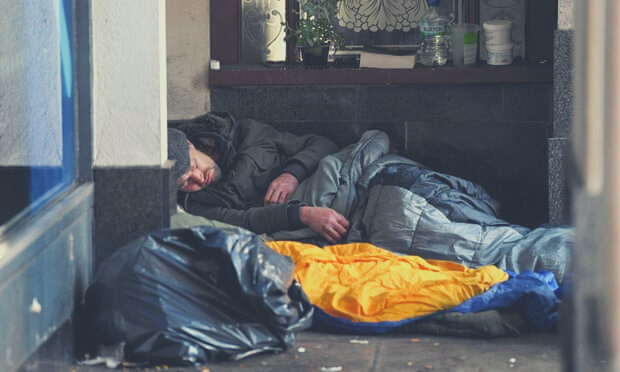On a chilly afternoon in Glasgow, Willy sits crossed-legged on the floor, his hands tucked into the sleeves of his hoodie. The normally bustling city centre is virtually deserted, the small plastic tub at his feet is empty.
“There’s no one around, so it’s hard,” he says. “It just means that I cannae get nothing to eat.”
The 42-year-old has been sleeping rough for the last four years, on and off. And despite nationwide efforts to get street sleepers into accommodation, he still doesn’t have a roof over his head.
“Of course I’m scared, I’m very scared,” he says. “But there’s nothing I can do. You need a house to self-isolate or a roof over your head. I’m just going to keep myself healthy as much as I can.”
Charities and local authorities are racing against the clock to secure enough accommodation for the UK’s homeless population to be able to self-isolate, with many winter night shelters set to close at the end of the month.
But while many rough sleepers have been accommodated thanks to a government £3.2m emergency fund, others remain on the streets and are seeing the services they rely on stripped back as staff are forced to self-isolate, volunteers forced to stay home and public gatherings banned.
Glass Door in London has stopped accepting new people into its night shelters, and reduced its dinner service to prevent overcrowding. As the supply of food and volunteers diminishes, the charity is considering distributing mobile phones with credit to continue to provide support.
The government is expected to announce plans to convert hotels and offices into safe units under a national action plan imminently – but many charities say securing the estimated 45,000 units needed is an uphill task.
Terry Gore at Catching Lives Day Centre in Canterbury says the charity has been told to contact the council for alternative accommodation only if clients are showing signs of the virus. “My hope is that accommodation will be made available to allow our rough sleepers to get off the street and self-isolate – but there is no sign of that at the moment,” he says. Instead the charity is supporting people on the streets, buying water bottles, cheap mobiles, pay as you go sim cards, power banks, and delivering food parcels.
The sector is facing “a perfect storm”, says Mark Grant at Action Homeless in Leicester. “In the last couple of days we’ve been working with the council, trying to identify accommodation, negotiating with some hotels on cost, seeing where we can move people into their own flats. But there is very little capacity anywhere. The housing system was already under pressure – there just aren’t spare hostels and houses.”
The decision about who needs to self-isolate is further complicated by a lack of testing among a population who regularly present with coughs and fever. “We’re operating blind,” says Grant.
People are already falling between the cracks. Glass Door in London reported sending a guest with symptoms to hospital for them to be sent home without testing; the Glasgow City Mission said guests who had potentially shared a large room with someone who had later tested positive for coronavirus were not given accommodation when its night shelter was closed because of their insecure immigration status.
And more pressure may be coming. Some charities the Guardian spoke to expressed concerns that if prisoners were released from prison, as has happened in the US, Spain and Iran, they would struggle to cope. “That would be very unhelpful when we are already dealing with unprecedented demand,” says Mel Hartley, project manager at St Petrock’s in Exeter.
As well as rough sleepers, figures released on Thursday revealed that 62,280 families are currently living in temporary accommodation in England – 5,400 of those with shared facilities. The number has increased by almost a third in the last five years.
Acknowledging that people in already economically precarious situations could quickly find themselves homeless because of the current crisis, the government protected people being evicted for non-payment of rent last week.
More needs to be done, says Polly Neate, CEO of Shelter. “We already had people choosing between rent and food. Now, with kids at home, that is going to be even more acute – they need help now.”
But while the situation is critical, it isn’t without hope, says Rick Henderson, CEO of Homeless Link. “It’s not impossible, but it will only happen if we take measures that have not been taken out of wartime. We have to take that action now, because if this gets into a 100-bed hostel where people share bathrooms and kitchens, we really are in trouble. The potential impact of it spreading doesn’t bear thinking about.”
Many charities the Guardian spoke to said there was political will to tackle the crisis at both a national and local level, a steely determination in the third sector, and compassion in the wider community. On Saturday, Crisis launched the campaign In This Together to raise funds to support people who are homeless during the outbreak.
“Maybe if we manage to find shelter for all who need it in this crisis, we will actually see that a home for all is possible,” said Melissa Kerschen of Glass Door. “It sounds like a cliche, but our fates are all interlinked, and this crisis is showing us that.”
On the streets of Glasgow, Willy simply hopes he will have a roof over his head soon. “I want to get in somewhere, I’m sick of living on the street,” he says. “I just don’t feel safe. I feel very vulnerable right now.”

